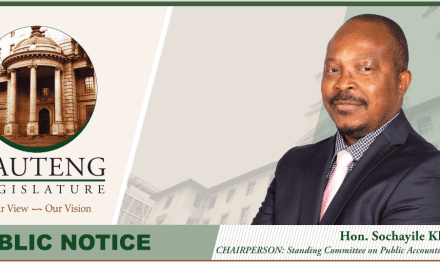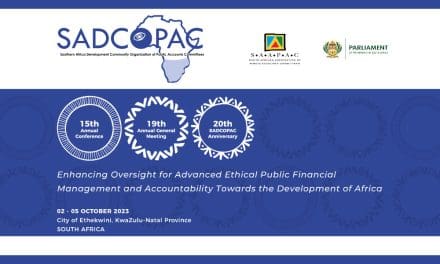Address by Hon. Sochayile Khanyile, General Secretary of the South African Association of Public Accounts Committees, to the NCOP Local Government Week, 13 September 2022
Introduction
The objects of local government as enshrined in Chapter 7 clause 152 of the Constitution of the Republic of South Africa, are intended to make the lives of the citizens better and accelerate the realisation of a “society based on the democratic values, social justice and fundamental human rights”. (Preamble of RSA constitution). As the constitution states, the financial and administrative capacity of a municipality will determine the pace at which these objects may be realised. It is in this regard that the South African Association of Public Accounts Committees (SAAPAC), at its recently held conference and AGM has resolved to support efforts to enhance oversight on financial management and accountability at municipal level. It did so with the understanding that the country’s vision to grow South Africa Together, will be strengthened by deliberating on that theme. This includes cooperating with and supporting Municipal Public Accounts Committee (MPACs) in playing their oversight role. SAAPAC by its design and as per one of its objectives, it is also about coordinating the efforts of national and province legislative sector to enhance oversight on financial management and accountability at municipal level. SAAPAC realised the importance of this approach when in 2017 it took a resolution to build a coordinated effort at local government sphere by establishing the National Association of Municipal Public Accounts Committees (NAMPAC), which is a vehicle to drive mechanisms created for enhanced oversight on financial management and accountability at local government sphere.
Oversight & Accountability explained
MPACs like all other Public Accounts Committees in South Africa, are tasked with the responsibility of conducting oversight on public financial management and accountability. This distinguishes Public Accounts Committees from what are referred to as portfolio-based committees, which have as their primary focus, oversight on service delivery and policy implementation. SAAPAC is of the view that ensuring effective public financial management is the responsibility of the Municipal Manager and Boards of municipal entities as defined in the Municipal Finance Management Act, amongst others. This point is fully understood in almost all municipalities. To paraphrase the intentions of section 62 of the PFMA, Municipal Managers are required to develop and implement systems to prevent any potential financial mismanagement and inefficient financial controls, including reporting such irregularities whenever they were to happen. Where it has happened, they must investigate and ensure appropriate management of consequences. The PFMA requires that the Executive Mayor should be the one who tables such a report at Council. This implies that it is the Executive Mayor who is accountable to the Council. I am raising this matter because there is reported resistance in several municipalities by Executive Mayors to appear before MPACs during hearings, to take responsibility of the content of the report they would have tabled. Various interpretations have been advanced on the role of the Public Accounts Committees at National and Provincial legislatures in conducting oversight on financial management and accountability at local government sphere. An opinion by the Legal Unit of the Gauteng Provincial Legislature has advise the Public Accounts Committee of that Legislature that it could not conduct joint oversight with an MPAC of a municipality. This is because the principle of cooperative governance instructs that one sphere must not encrouch on the functions of another. On the other hand, some Provincial Public Accounts Committees have conducted oversight on municipal financial management matters either jointly with MPACs or without them. This matter is not an issue with SCOPA of National Assembly because legislation provides as such as it relates to them.
Enhanced Ex Post Facto
The weakness of in-year reports, including the Section 71 Report at local government sphere, is that they are not detailed on matters of financial management as they focus more on expenditure patterns. The Section 71 reports at metropolitan municipal level are easily referred to the various section 79 committees aligned to the respective portfolios in a municipality. MPAC only consider these reports if there are matters which these Section 79 Committees consider as competencies of MPACs and have referred these to them on that account. In the case of District and Local Municipalities, the financial and composition incapacities restrict them from establishing such Section 79 Committees. The Section 71 Reports are considered by MPACs in these municipalities, although there is very little if any which relates to financial management and controls matters, expect on expenditure, which would have been the responsibility of the Finance Section 79 Committee had a District or Local Municipality had capacity to establish such. It can be argued that Internal Audit in municipalities whether they are Metros, Districts or Local municipality, are strategically placed to provide their reports to the MPACs. This reality unfortunately does not exist because of the difficulties of political management of the systems at that level and the levels of potential for collaboration on financial mismanagement. It is in this regard that our collaborative effort as Public Accounts Committees at National and Provincial Legislatures is required. Realising this, SAAPAC has resolved on a process of encouraging its Member jurisdictions, the Public Accounts Committees in the various legislatures, which includes national Parliament, to investigate, find and possibly propose legislative mechanisms for the revision of the content of the Section 71 Reports. This is to either include reports on demonstrating effectiveness of financial management and controls, or to strengthen the role of the national and provincial Public Accounts Committees in conduction legislative oversight on the section 71 municipal reports when they are tabled with the MEC responsible for Local Government and/or Relevant Treasury. We need to ensure collaboration amongst portfolio or parliamentary committees responsible for oversight on cooperative governance, finance, and public accounts. The other mechanisms which we as legislatures should propose is the legislative intervention.
Ex Post Facto versus Ex Ante
It is argued that MPACs, like it is with Public Accounts Committees at national and provincial legislatures, play their oversight role ex post facto. In its assessment of this oversight mechanism, SAAPAC has identified weaknesses because of the period it takes for the audit reports to be finalised and presented to the public accounts committee for consideration. In the case of Municipalities which are the topic of our discussion, the said reports by the Auditor-General of South Africa, serve before MPACs after they have been tabled at and referred by the Council. This is around November or December. By the time MPACs have finalised their oversight responsibility and table their reports with recommendations, it is almost 9 months after the end of the year under review. The recommendations of MPACs could have little meaning because they could be communicated almost at the end of the new year. In some cases, by that time, the same gaps in the financial management and controls could have been repeated. It is in this regard that there is a need to consider strengthen ex post facto legislative oversight as an effective mechanism. MPACs will need to be capacitated with mechanisms to make recommendations that require the reporting on implications of implemented interventions in the new financial year. The effective mechanism, however, is that which the AGSA has challenged public accounts committees in South Africa to introduce. This is oversight on financial controls. MPACs will have to receive from the Municipal Managers, plans for effective financial management and controls for their assessment. These should be received through the Executive Mayor who is accountable to Council. It is based on these submitted financial management and controls plans that MPACs will have to conduct ex ante oversight, and then utilise these on a quarterly basis to conduct in-year monitoring.
Capacities of MPACs
The recent amendments of Municipal Structures Act which clearly explain the functions and composition of MPACs, will go a long way in assisting to strengthen the effectiveness of these oversight bodies. The proposals and intentions expressed in my input and the intentions of the amended Municipal Structures Act on MPACs could be jeopardized by lack of sufficient and adequate resources at the disposal of MPACs, especially in District and Local Municipalities. These are the research capacity, capacity to follow-up on recommendations which would have become resolutions of Council. This includes availability of sufficient time for Councillors in MPACs to thoroughly conduct scrutiny of the reports. The collaboration amongst National and Provincial Legislative oversight committees on matters related to municipal financial management and accountability, should be explored, and where it exists be strengthened. In addition, this must be a collaboration to get relevant government departments to plan for, executive and ensure effectiveness of their programmes to build capacity of MPACs. Provincial Speaker’s Forums could play a major role as mechanisms to enhance oversight on municipal financial management and accountability. This they could do by constantly addressing difficulties faced by MPACs and collaborating to find ways to provide additional financial and human resources for municipalities to capacitate their oversight mechanisms, especially MPACs.
Public Participation
Let me conclude by stating that our collective effort will not succeed without one important cornerstone of our democracy – the participation of the people of South Africa South Africans have demonstrated their willingness to actively participate in ensuring ethical governance. The various independent bodies intended to advance ethical governance at municipal level are abound. This includes professionals and individuals whose speciality and interest are on the success of financial management and accountability at municipal level. They are readily available to offers their services. It is the view of SAAPAC that NAMPAC is an appropriate vehicle to galvanise support amongst these bodies to support individual MPACs to strengthen their oversight mechanism. MPACs need to be assisted to build their capacity to utilise the provision that they can solicit the support of these resources in performing their oversight responsibilities The bigger challenge is the capacity to get the ordinary women and men to be active participants in support of oversight on financial management and accountability. This is because to these citizens, matters of financial management accountability could be of a higher comprehension. Unfortunately, MPACs, like all Public Accounts Committees at National and provincial legislatures, are duty bound by our constitution to strive for the participation by all citizens. Mechanisms that should be prioritised by MPACs is strengthened public education for empowerment, which will result in active participation. One advantage MPACs have at their disposal are Ward Committees. Developing focused and deliberate information, could easily propel the widening of public education in this regard.








